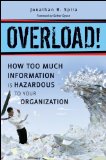The Rise of the Data Dragon
Suffering from too much information (T.M.I.)? According to a recent Basex research study on information overload, you’re not alone. It’s becoming more and more apparent that my prediction of the Top 5 Time Wasters in the 21st century is indeed coming true.
As a recap, they are:
- Multitasking
- Poor Data Management
- Lack of Tools & Techniques
- Unclear Prioritization
- Miscommunication
One could wrap all these in a neat bow under the rubric “information management”. Knowledge workers are particularly afflicted.
Take recovery time as an example. When we are interrupted, whether it be a phone call, instant message or child crying in the next room, it takes up to twenty times the duration of the actual interruption to regain concentration on the task at hand.
It is estimated that 28 billion hours are lost in the United States each year due to information overload. That’s a whopping 1.68 trillion minutes.
That’s a lot of minutes. That’s a lot of time.
Baseline magazine featured an article by Basex CEO Jonathan Spira, who also authored Overload! How Too Much Information Is Hazardous to Your Organization. While I have not read the book itself, I must say his article is quite enlightening.
To summarize the report’s most astounding statistics:
• Digital barrage: 100 emails can chomp half of a work day.
• The “cc” beast: Eight hours are lost for every 100 people who are unnecessarily copied on an email.
• Bloated government processes: 58 percent of government workers spend half the workday filing, deleting or sorting information, which costs the U.S. taxpayer almost $31 billion dollars annually.
• Chronic time starvation: 66 percent of knowledge workers say they don’t have enough time every day to get everything done.
• Overwhelm! 94 percent of those surveyed have experienced information overload to the point of paralysis at some point.
Yowza.
So it’s not just you, sitting there glaze-eyed on the couch at night. Many of us are fighting the data dragon every day.
Given this blog offers solutions (and, luckily, so does Jonathan’s article), I offer you some tips and tricks to slay the data dragon.
1. Set limits. We all have them. Snap off your phone well before bedtime. You will sleep better if you do.
2. Read a good book before you go to bed. Research shows that even six minutes of reading can reduce stress levels by 68%.
3. Don’t “cc” the world. Chances are they don’t need to know every granular detail.
4. Unsubscribe. Do you delete emails out of habit instead of handling them at the source? If you delete, refuse a repeat. Unsubscribe. Ruthlessly.
5. Spend time “on the ground”. Denise Stewart taught me that phrase in a powerful speech about going for your dreams that she gave at a blogger conference last year. That means to go offline and live truly, not just virtually.
You can slay the data dragon by giving it short leash to your life. What other ways do you battle T.M.I?

Brad Shorr
January 17, 2012 at 7:36 pmThis is great advice. The data overload creeps up so easily … each piece of data is so small it’s barely noticeable, but your statistics show how it adds up. It reminds me of cigarettes. Each individual cigarette is so small and seems so harmless. But they add up – data overload is just as unhealthy, if not physically at least spiritually and mentally. Big problem. Please keep talking about it.
powerofslow
January 17, 2012 at 8:04 pmI appreciate your insights, Brad. It is a modern-day problem. We need to build better filters, according to Clay Shirky. I think he’s right!